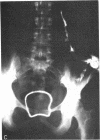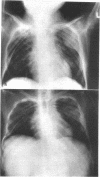Abstract
Transfer factor (TF) derived from donors with strong delayed hypersensitivity to coccidioidin (CDN) was administered to four patients with active disseminated or progressive pulmonary coccidioidomycosis. The clinical and immunologic response to TF was studied.
Before the administration of TF, all four patients had defective thymus-derived lymphocyte (T-cell) function. In no case were lymphocytes in culture stimulated to incorporate [3H]thymidine when exposed to CDN. Cases 1 and 2 had no skin test response to CDN or other antigen, nor was antigen-induced migration inhibition factor (MIF) release detected. Cases 3 and 4 had skin reactivity to CDN as well as MIF release. Lymphocyte reactivity to phytohemagglutinin (PHA), as measured by the incorporation of [3H]thymidine, was low or absent in all.
After the administration of TF, patients with negative skin tests became reactive to CDN, MIF release was present in all but case 1, and lymphocyte stimulation was present in response to CDN in all.
Lymphocyte reactivity to PHA was also increased after the administration of TF in all cases. All responses to single doses of TF were transient, lasting no more than 10 days. Subsequent doses were less effective at restoring lymphocyte stimulation once it had waned. Multiple doses of TF administered at frequent intervals appear to be the most effective way to maintain lymphocyte reactivity.
Clinical response to the administration of TF correlated closely with specific transfer as measured by response to CDN in skin test, lymphocyte stimulation, and MIF release. After TF administration, all patients mounted a more effective host response against the infecting fungus. In each patient, smears and cultures became negative. Fistulas, when present, diminished in extent or closed; and pulmonary infiltrates cleared. Nonspecific signs of infection such as fever, weight loss, and anorexia also improved. Clinical improvement paralleled immunologic improvement. When immunologic improvement was transient so was clinical improvement. Multiple doses of TF at frequent intervals may maintain transferred T-cell reactivity. TF may prove to be a useful adjunct in the management of patients with coccidioidomycosis. Whether TF from CDN-negative donors may have similar effects is not known and requires exploration.
Full text
PDF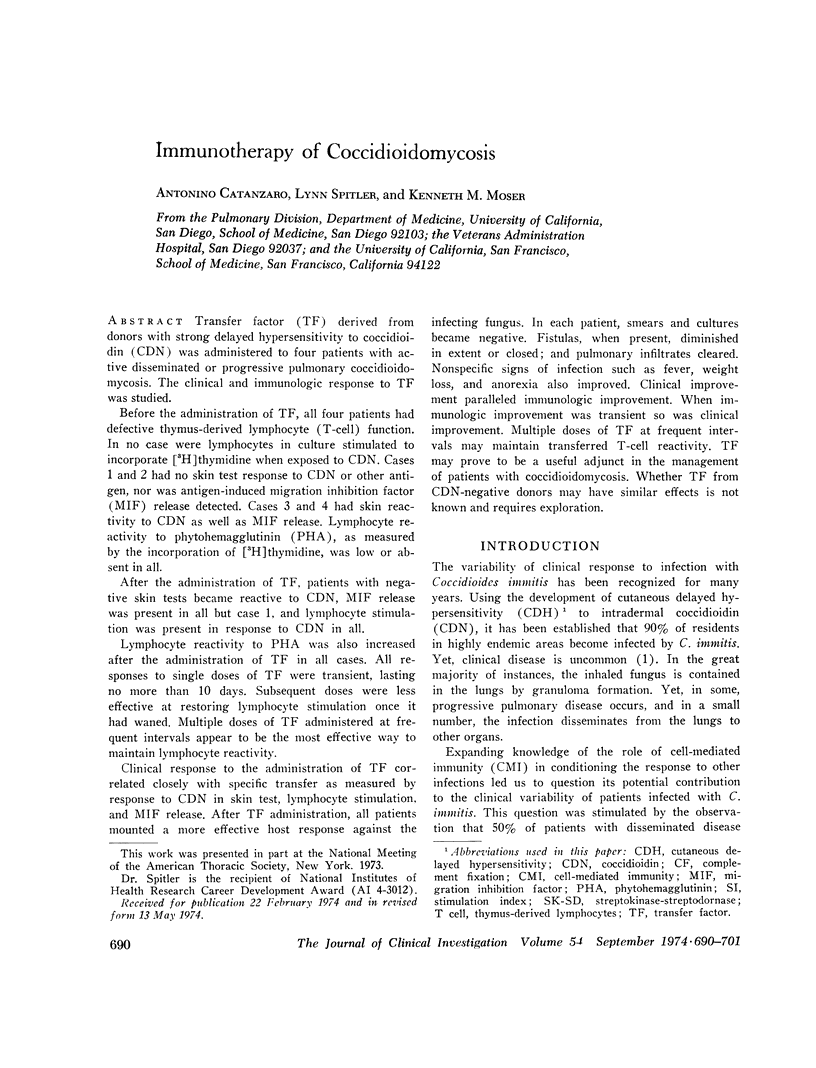
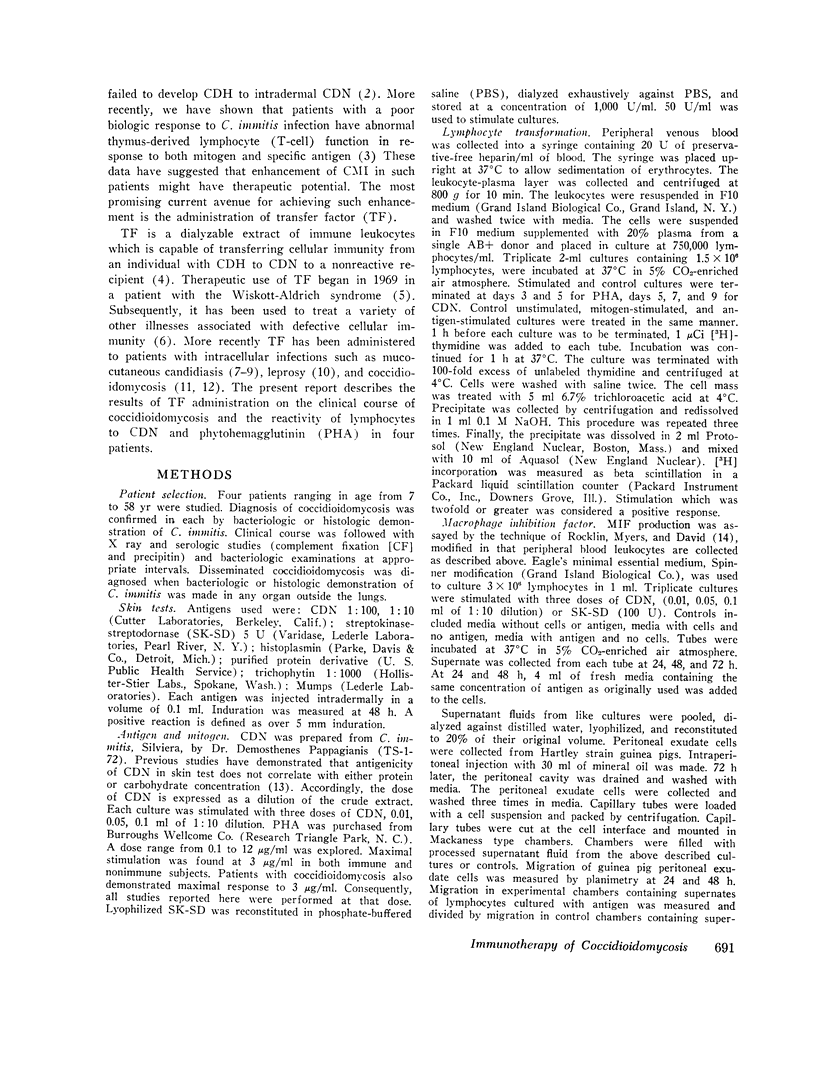
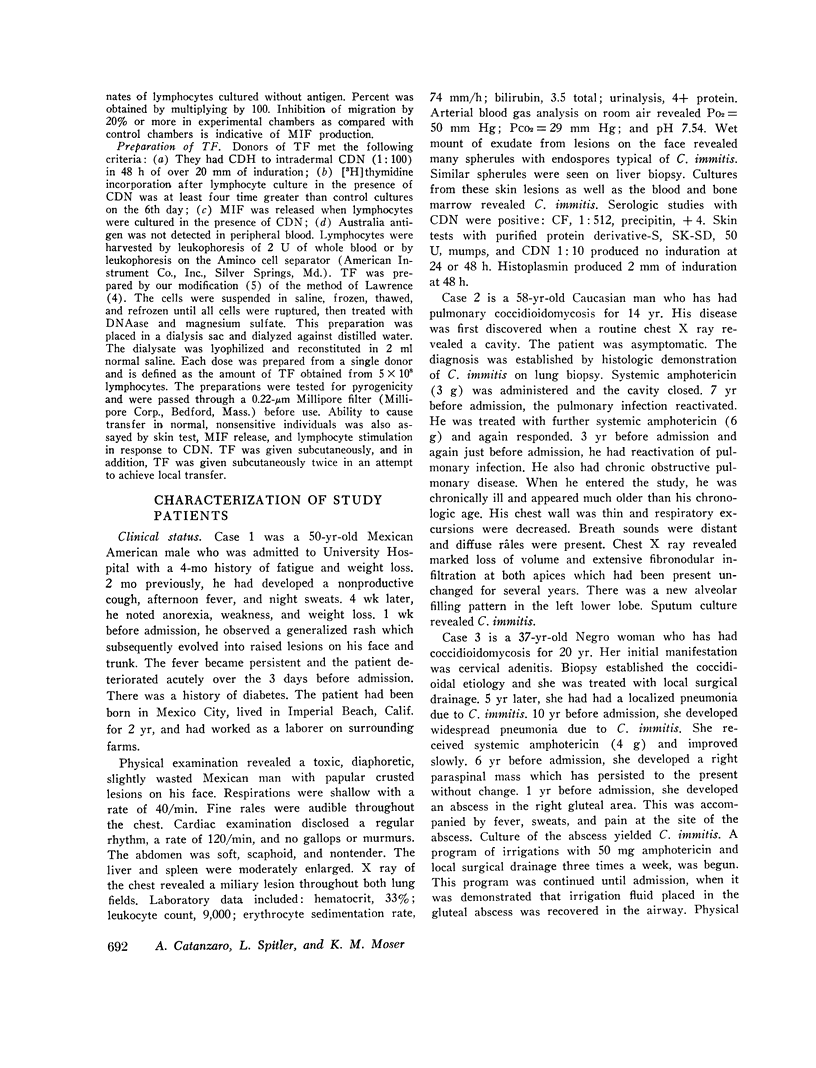
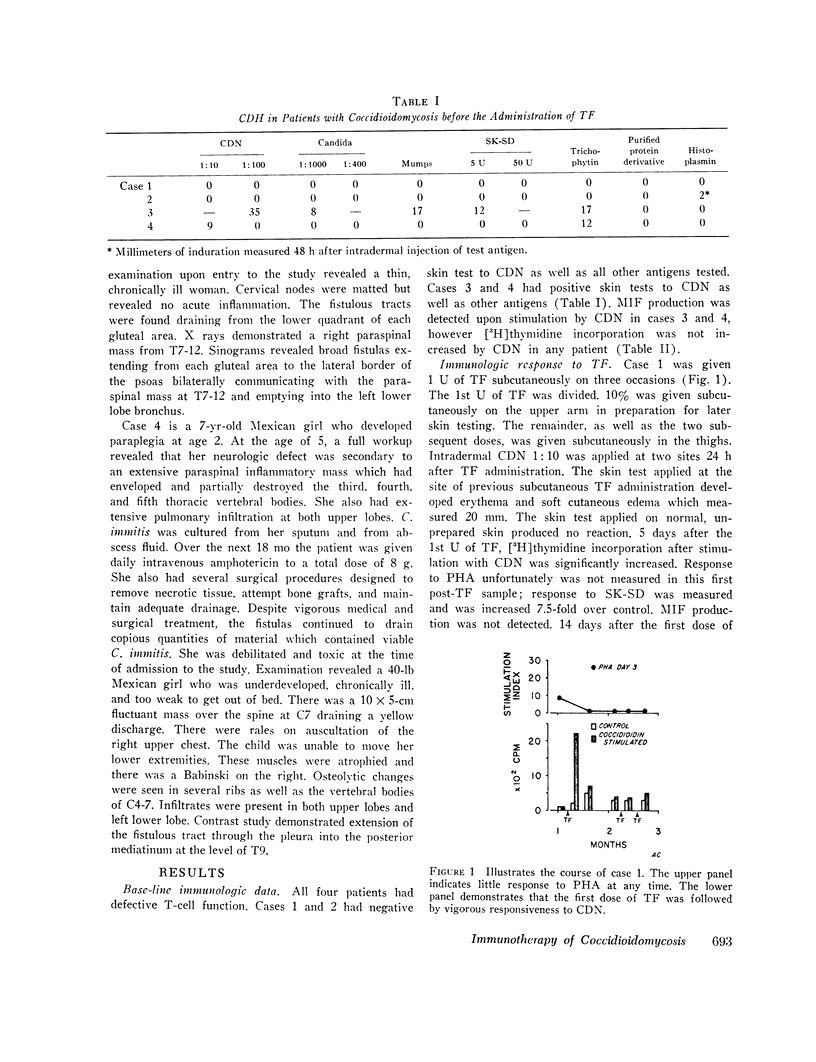
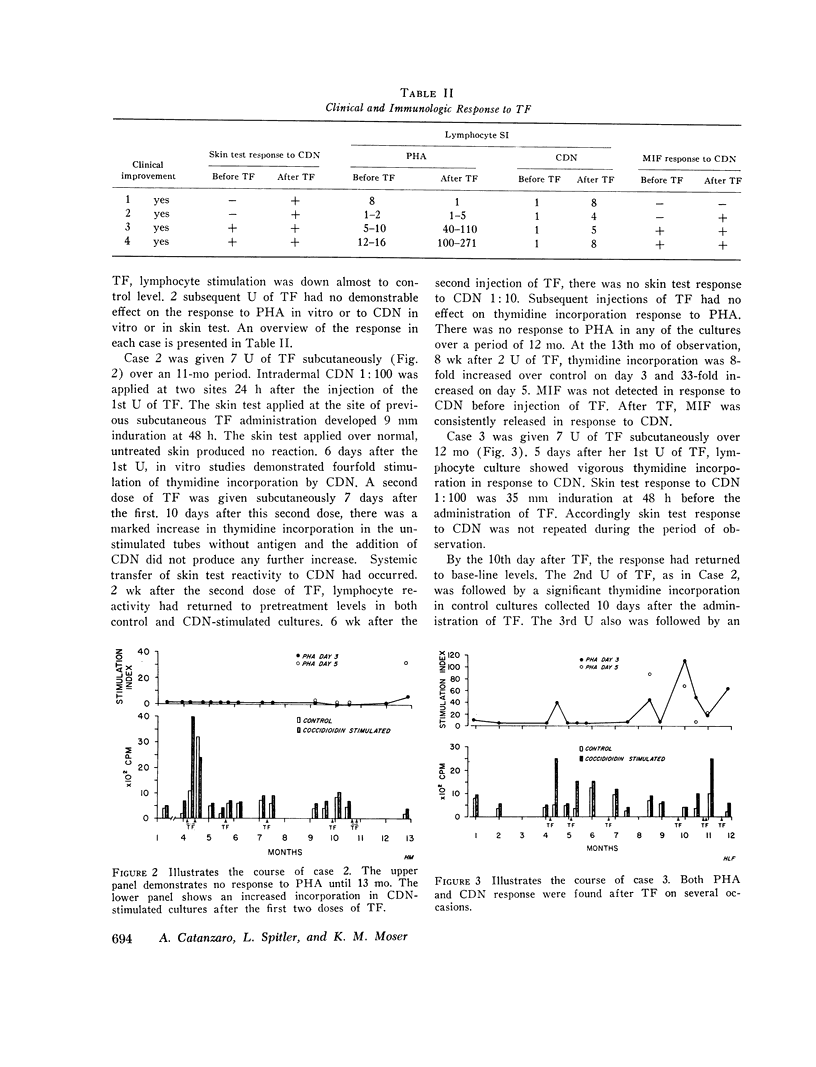
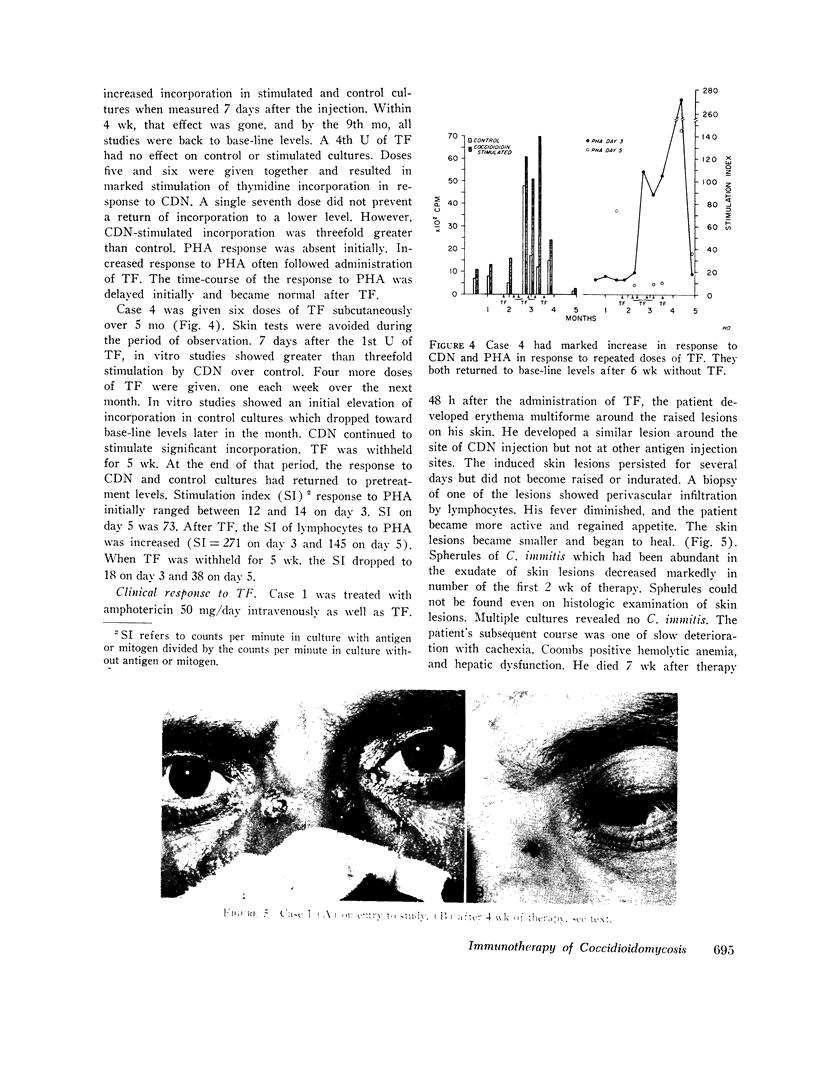
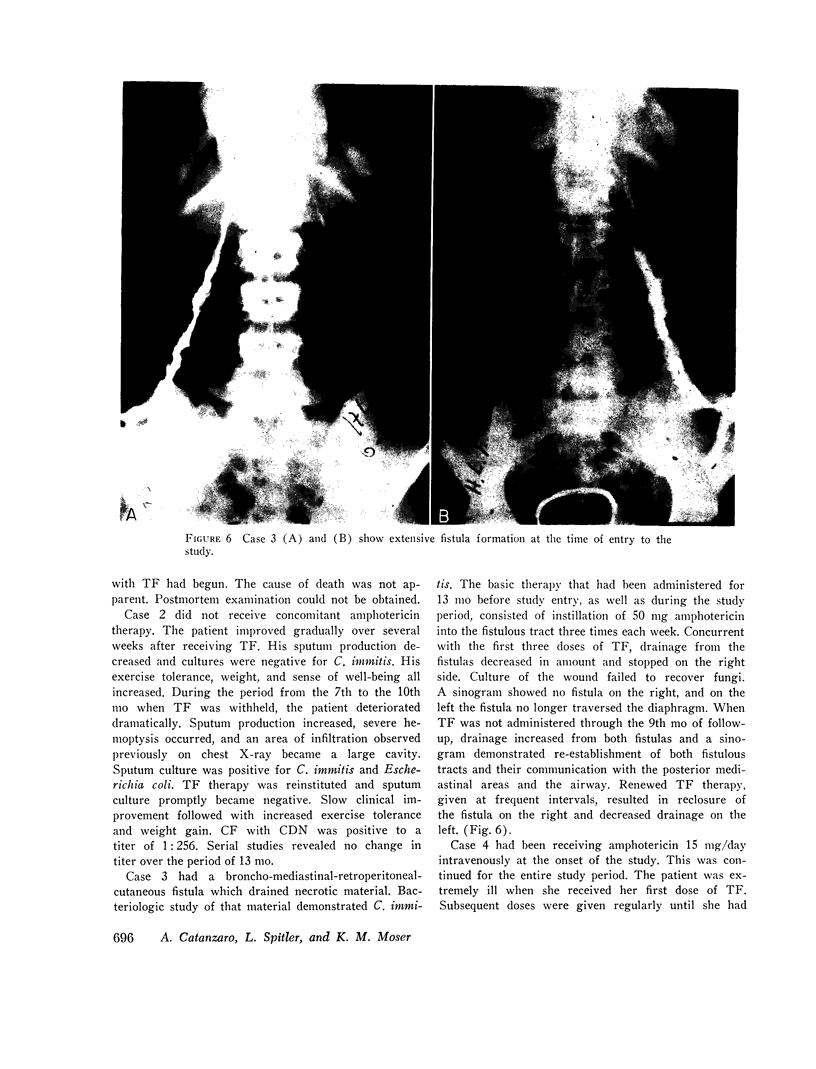
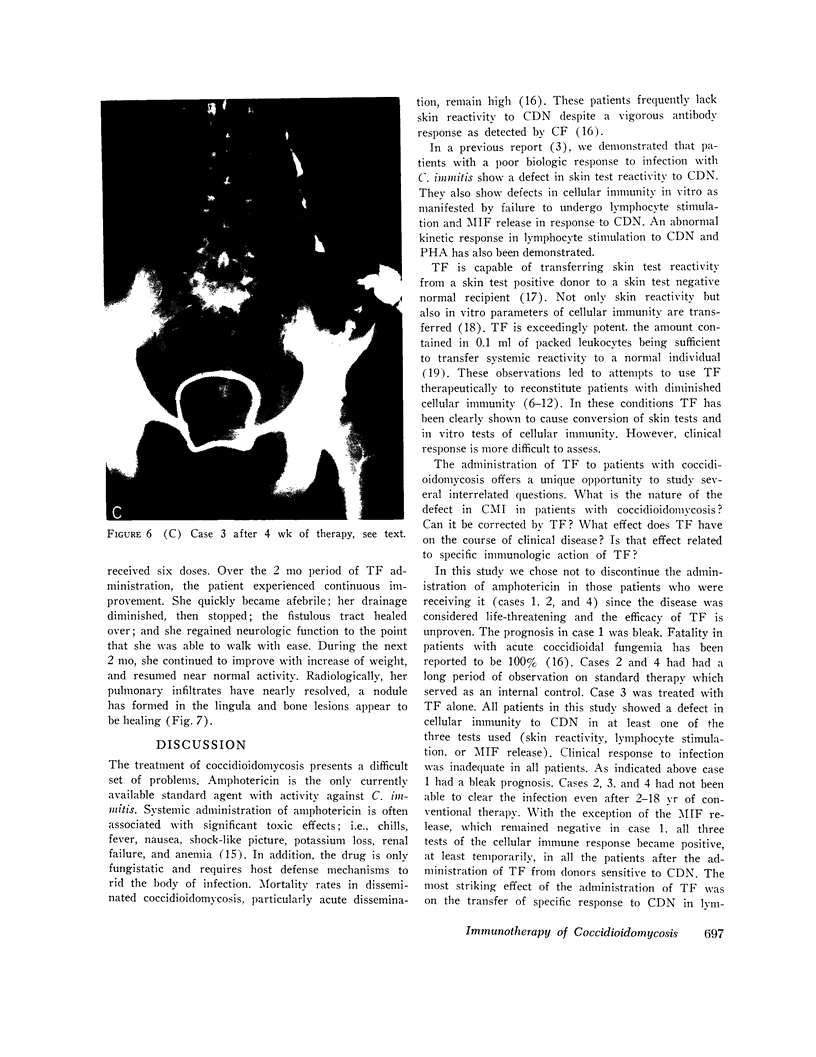
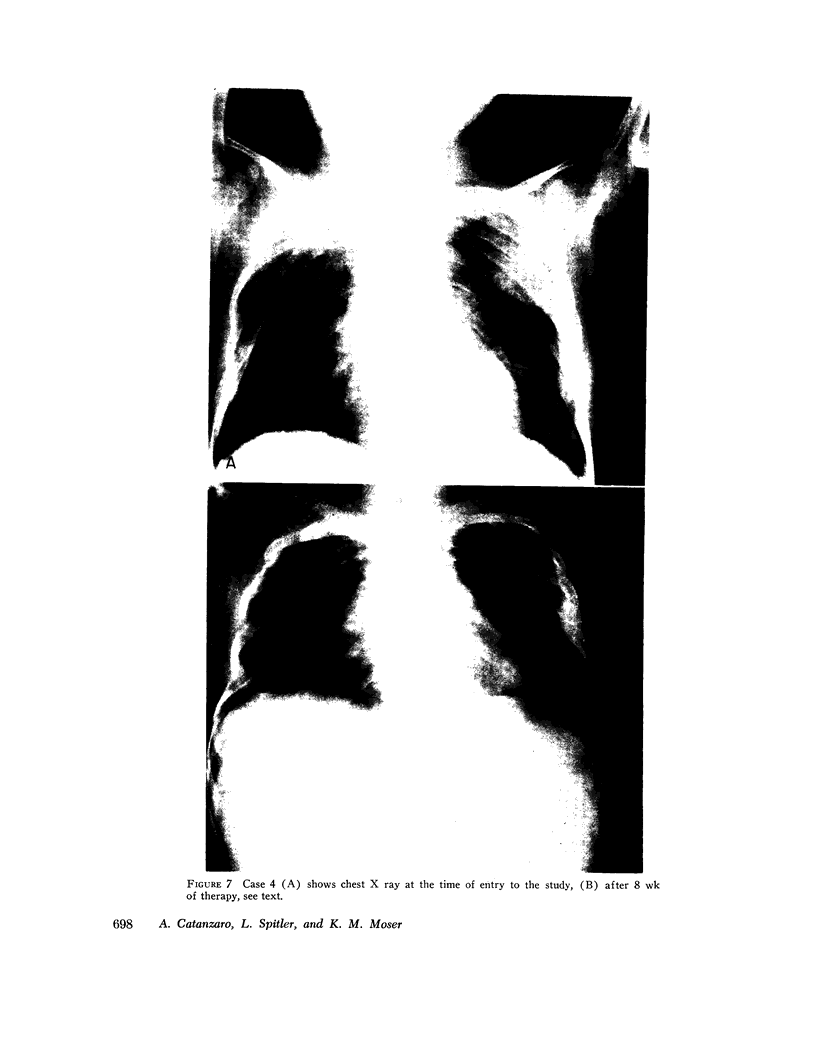
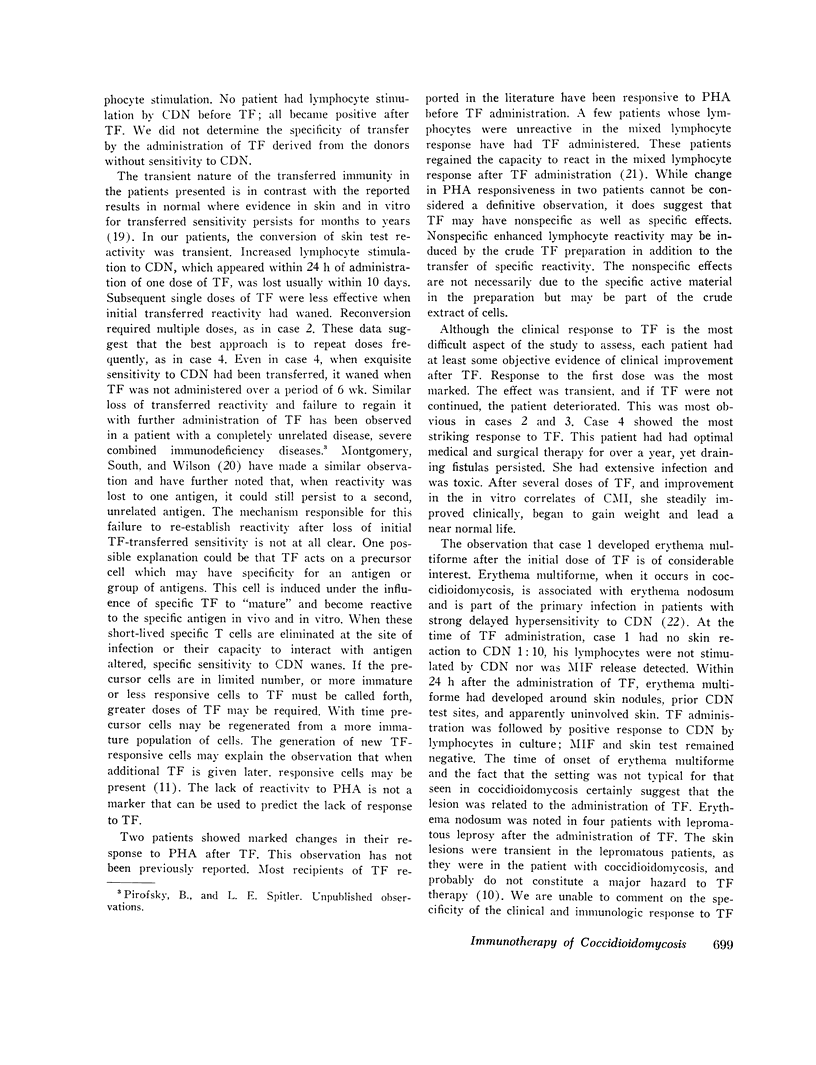
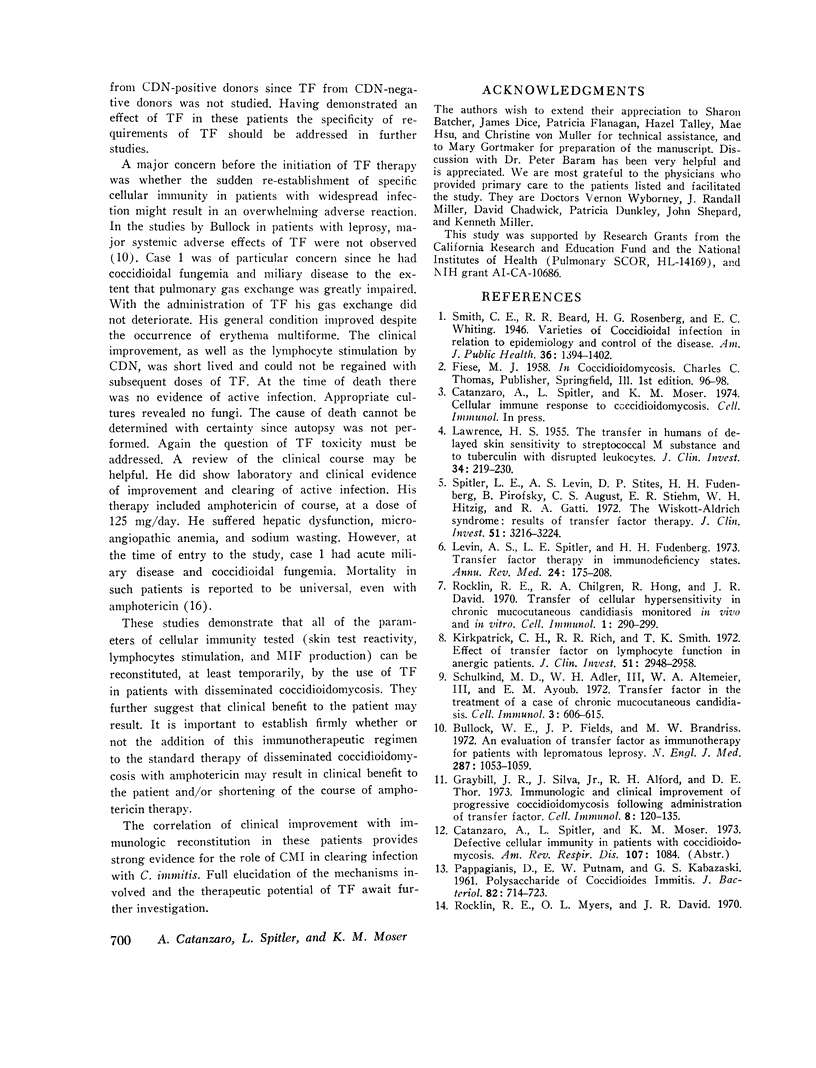
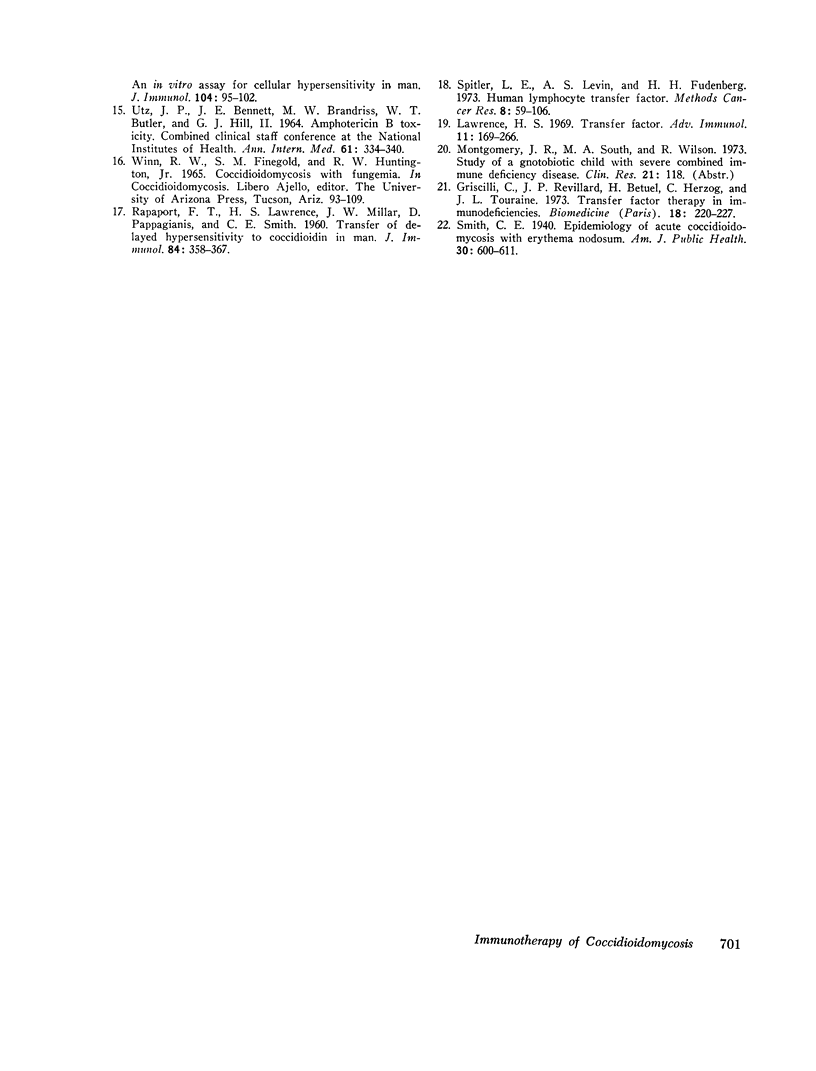
Images in this article
Selected References
These references are in PubMed. This may not be the complete list of references from this article.
- BENNETT J. E. AMPHOTERICIN B TOXICITY; REVIEW OF SELECTED ASPECTS OF PHARMACOLOGY. Ann Intern Med. 1964 Aug;61:335–340. doi: 10.7326/0003-4819-61-2-335. [DOI] [PubMed] [Google Scholar]
- Bullock W. E., Fields J. P., Brandriss M. W. An evaluation of transfer factor as immunotherapy for patients with lepromatous leprosy. N Engl J Med. 1972 Nov 23;287(21):1053–1059. doi: 10.1056/NEJM197211232872101. [DOI] [PubMed] [Google Scholar]
- Graybill J. R., Silva J., Jr, Alford R. H., Thor D. E. Immunologic and clinical improvement of progressive coccidioidomycosis following administration of transfer factor. Cell Immunol. 1973 Jul;8(1):120–135. doi: 10.1016/0008-8749(73)90099-3. [DOI] [PubMed] [Google Scholar]
- Griscelli C., Revillard J. P., Betuel H., Herzog C., Touraine J. L. Transfer factor therapy in immuno-deficiencies. Biomedicine. 1973 May;18(3):220–227. [PubMed] [Google Scholar]
- Kirkpatrick C. H., Rich R. R., Smith T. K. Effect of transfer factor on lymphocyte function in anergic patients. J Clin Invest. 1972 Nov;51(11):2948–2958. doi: 10.1172/JCI107119. [DOI] [PMC free article] [PubMed] [Google Scholar]
- LAWRENCE H. S. The transfer in humans of delayed skin sensitivity to streptococcal M substance and to tuberculin with disrupted leucocytes. J Clin Invest. 1955 Feb;34(2):219–230. doi: 10.1172/JCI103075. [DOI] [PMC free article] [PubMed] [Google Scholar]
- Lawrence H. S. Transfer factor. Adv Immunol. 1969;11:195–266. doi: 10.1016/s0065-2776(08)60480-0. [DOI] [PubMed] [Google Scholar]
- Levin A. S., Spitler L. E., Fudenberg H. H. Transfer factor therapy in immune deficiency states. Annu Rev Med. 1973;24:175–208. doi: 10.1146/annurev.me.24.020173.001135. [DOI] [PubMed] [Google Scholar]
- PAPPAGIANIS D., PUTMAN E. W., KOBAYASHI G. S. Polysaccharide of Coccidioides immitis. J Bacteriol. 1961 Nov;82:714–723. doi: 10.1128/jb.82.5.714-723.1961. [DOI] [PMC free article] [PubMed] [Google Scholar]
- RAPAPORT F. T., LAWRENCE H. S., MILLAR J. W., PAPPAGIANIS D., SMITH C. E. Transfer of delayed hypersensitivity to coccidioidin in man. J Immunol. 1960 Apr;84:358–367. [PubMed] [Google Scholar]
- Rocklin R. E., Chilgren R. A., Hong R., David J. R. Transfer of cellular hypersensitivity in chronic mucocutaneous candidiasis monitored in vivo and in vitro. Cell Immunol. 1970 Sep;1(3):290–299. doi: 10.1016/0008-8749(70)90050-x. [DOI] [PubMed] [Google Scholar]
- Rocklin R. E., Meyers O. L., David J. R. An in vitro assay for cellular hypersensitivity in man. J Immunol. 1970 Jan;104(1):95–102. [PubMed] [Google Scholar]
- Schulking M. L., Adler W. H., 3rd, Altemeier W. A., 3rd, Ayoub E. M. Transfer factor in the treatment of a case of chronic mucocutaneous candidiasis. Cell Immunol. 1972 Apr;3(4):606–615. doi: 10.1016/0008-8749(72)90122-0. [DOI] [PubMed] [Google Scholar]
- Smith C. E. Epidemiology of Acute Coccidioidomycosis with Erythema Nodosum ("San Joaquin" or "Valley Fever"). Am J Public Health Nations Health. 1940 Jun;30(6):600–611. doi: 10.2105/ajph.30.6.600. [DOI] [PMC free article] [PubMed] [Google Scholar]
- Spitler L. E., Levin A. S., Stites D. P., Fudenberg H. H., Pirofsky B., August C. S., Stiehm E. R., Hitzig W. H., Gatti R. A. The Wiskott-Aldrich syndrome. Results of transfer factor therapy. J Clin Invest. 1972 Dec;51(12):3216–3224. doi: 10.1172/JCI107148. [DOI] [PMC free article] [PubMed] [Google Scholar]





